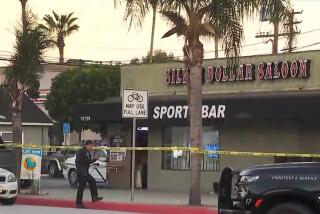Officer Who Shot Man Was Named in 2 Suits
- Share via
The unarmed grandfather who was killed during a controversial drug raid in Compton was shot by an El Monte police veteran who had been named as a defendant in two excessive-force lawsuits, according to interviews and court records.
The FBI is investigating the Aug. 9 shooting of 65-year-old Mario Paz to see whether police violated his civil rights.
Armed with a search warrant, Police Sgt. George Hopkins, 43, led a score of El Monte SWAT officers on the nighttime raid of Paz’s home. Police shot the locks off doors and stormed inside, looking for an alleged drug dealer who had used the address in the past.
Hopkins found Paz in his bedroom and thought he was reaching for a weapon in a drawer, police said. The sergeant--a police officer for 19 years--opened fire, fatally shooting Paz twice in the back as his wife watched.
Guns were later recovered from the drawer, police said, but authorities found no evidence of illegal drug trafficking.
Assistant Chief Bill Ankeny released little information about Hopkins, saying only that he is a “good officer” who has been a sergeant for five years. Hopkins did not respond to requests for an interview.
“You don’t make it to the level he has without being a good officer first,” said Ankeny.
In the early 1990s, as president of the El Monte Police Officers Assn., Hopkins emerged as a powerful and controversial figure in local politics. During the city’s bruising 1994 election campaign, he led officers in an effort to unseat former Mayor Patricia Wallach.
A homeless man, Richard Ruley, told sheriff’s deputies that Hopkins had paid him to destroy Wallach’s campaign signs. Upon learning of the allegations, the mayor filed a police report against the sergeant. Ruley soon after moved to Victorville.
El Monte detectives, all of whom belong to the police association, were assigned to investigate the case. They concluded that Wallach had paid Ruley to leave town. Wallach and Hopkins denied any wrongdoing.
Hopkins also has been the target of two lawsuits alleging police brutality.
In 1995, Hopkins was among 18 officers involved in a melee at an El Monte home where they were responding to complaints of a noisy birthday party for a 3-year-old. According to a federal lawsuit filed on behalf of 16 Latino plaintiffs, the officers began shouting in English, which few of the partygoers understood. The officers, according to the suit, began to “physically abuse the guests, kicking and shoving folding chairs beneath them.”
When some of the guests began defending their friends and relatives, an 11-year-old girl was struck in the head with a flashlight or baton, and others were kicked and hit with chairs. Officers allegedly used pepper spray on all the party guests, including children sleeping upstairs, according to the lawsuit.
Three of the guests were prosecuted for assaulting officers and resisting arrest but were acquitted. Their defense attorney, Thomas Beck, said Hopkins did not participate in the alleged beating but, according to the lawsuit, helped cover it up. He allegedly ordered officers to tear open trash bags and dump beer on the floor, Beck said, then filmed the scene to make the party seem more raucous.
“He was one of the major players involved in the cover-up,” said Beck. “But as far as I know, he was not involved in any of the abuse.”
The official account, according to court records, is far different from the allegations by plaintiffs in the lawsuit. “When officers contacted the residents, they were confronted with an angry mob of partygoers who attacked and battered the officers,” said one document.
The city settled the lawsuit in 1998, paying $165,000 to the plaintiffs, Beck said.
In a second accusation against Hopkins, laborer Carlos Morales alleged in a lawsuit that on Aug. 22, 1982, Hopkins and Officer Dennis Miller struck him in the midsection and neck, and falsely arrested him for obstructing an officer.
Charges against Morales were later dropped, court records show.
“The plaintiff had not committed any crime or public offense,” the lawsuit said. It is unclear how the lawsuit was resolved. Morales’ attorney said he did not have records indicating the outcome, and city officials could not find the case in their archives.
More to Read
Sign up for Essential California
The most important California stories and recommendations in your inbox every morning.
You may occasionally receive promotional content from the Los Angeles Times.














